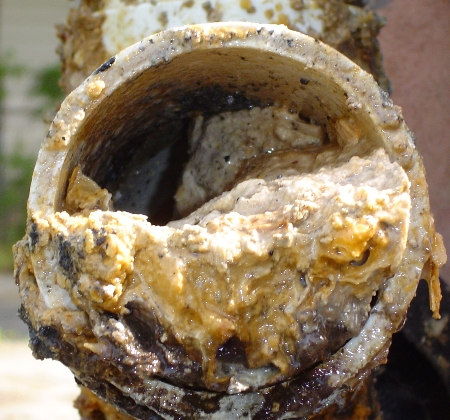
Toxic Sludge Is Good for You?May 25, 2010 - Stephen Lacey - renewableenergyworld.comDeep down in the sewer system lies a toxic menace that grows larger with each passing day, waiting to rise up and wreak havoc on society. No, it's not some deranged underground monster. It's something far scarier (for utilities anyway) – Grease. Each year, water utilities spend hundreds of millions of dollars dealing with sewer grease, a rancid mixture of fats, grease and oils that erode wastewater treatment pipes, clog the system and cause environmentally-hazardous back-ups. Also called brown grease, this bothersome gook comes from industrial-kitchen grease traps and household waste. The National Renewable Energy Laboratory estimates that 500 million gallons of grease moves through the water system in the U.S. each year, costing utilities a lot of time and money to haul the waste, replace lost infrastructure and clean up sewer overflows. But what if this 500-million-gallon liability could be turned into a renewable energy asset? In 2004, the founders of a small biodiesel company called Philadelphia Fry-o-Diesel looked at the nation-wide sewer grease problem and decided it offered the perfect opportunity to grow their business. Rather than process yellow grease – a high-demand product with many secondary uses – the company decided to focus on brown grease. Philadelphia Fry-o-Diesel soon became BlackGold Biofuels. “Anything that smells really, really bad, that nobody else wants – that's our sweet spot,” says Emily Landsburg, CEO of BlackGold Biofuels.
Over the last six years, BlackGold has developed a process to break down this low-grade material and turn it into high-grade biodiesel. The company has been operating a pilot plant in Philadelphia since 2005 that has produced thousands of gallons of biodiesel. BlackGold claims it's the first company to find a way to cost-effectively process these scummy feedstocks. Despite the name of BlackGold Biofuels, executives don't consider the company a biofuels producer. Instead, says Landsburg, the company is a wastewater treatment company. Rather than do all the dirty work of hauling and processing the sewer grease, BlackGold is licensing its technology to water utilities and giving them the tools to create a new revenue stream. The city of San Francisco is finishing installation of a 100,000 gallon-per-year facility – the first sewer grease-to-diesel system in the U.S. San Francisco spends $3.5 million a year just to clean the grease out of the sewers. Landsburg says it will take only a few years to pay back the cost of installing BlackGold's technology. “You're getting paid to take a waste material and you're converting it into a commodity that sells at a premium to diesel fuel. So your refining margin is extraordinary,” she says. “Return on investment can be two to three years, depending on the size of the system.” BlackGold is representative of the new innovation happening in the “hydrocosm,” as Lux Research Analyst Heather Landis likes to call it. Grease is just one of the many cost liabilities that water utilities must deal with. The other big one is sewage sludge, the putrid mixture of solids and liquids that are left over after wastewater is treated. Utilities have three options for getting rid of sewage sludge: they can landfill it (which is expensive and limited); they can burn it (which produces toxic ash); or they can spread it on agricultural land (which is now recognized as hazardous to health). According to Lux Research, sludge treatment and disposal represents 20-50 percent of a water utility's operating costs. That amounts to $10 billion in energy costs world-wide each year. So what to do with all this costly, environmentally hazardous waste? Increasingly, sewage sludge is being mined for energy. “It provides a great opportunity to...minimize the amount of sludge that needs to be disposed,” says Lux's Heather Landis. A new report from Lux projects the global sludge-to-energy market will be around $30 billion by 2020. That includes energy recovery technologies like anaerobic digestion, gasification and biofuels production. These technologies offer utilities – many of which are owned by cash-strapped municipalities – an immediate way to create new revenue streams. Companies like BioPetrol, EnerTech, and Huber Technology are all working on various ways to recover energy from sludge. A number of University labs are working on conversion technologies as well. And in the last few years, dozens of municipalities in North America (including Vancouver's Olympic Village) have been implementing sewage energy-recovery technologies. Overall movement has still been fairly slow. Like in the electricity industry, water utilities don't exactly implement technological change quickly. Although utilities recognize the need to find more cost-effective ways to deal with sludge, many of them are still taking a “wait and see approach,” says Landis. “Utilities don't want to be a guinea pig...but if the value proposition is right, I feel that utilities will be willing to embrace these new technologies,” she says. “It's potentially a win-win if they implement the right technology.” If projects like the one being developed in San Francisco by BlackGold Biofuels are successful, it could open the door to an underserved energy market worth tens of billions of dollars. But for now, utilities will just have to keep spending millions of dollars each year to keep the pipes clean. For a look at how bad the grease problem can get in the sewer system, check out this video: http://www.youtube.com/watch?v=VvV4Nu0yb40&feature=player_embedded
|
Email this page to a friend


